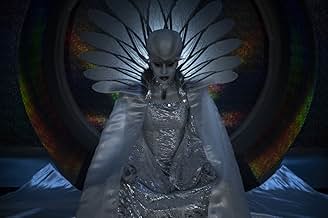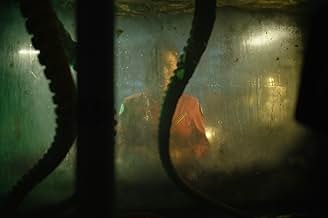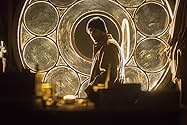Es una nueva versión de la clásica serie de ficción sobre relatos de ciencia ficción, misterio y terror.Es una nueva versión de la clásica serie de ficción sobre relatos de ciencia ficción, misterio y terror.Es una nueva versión de la clásica serie de ficción sobre relatos de ciencia ficción, misterio y terror.
- Nominado a 1 premio Primetime Emmy
- 5 premios ganados y 13 nominaciones en total
Explorar episodios
Opiniones destacadas
I spent every episode waiting. And that's it. I just wait for something that never happens. Casting is good and the acting is on par, but the stories are just... blah... Hopefully they can get some better stores in future seasons.
The thing that sets the original The Twilight Zone apart is that each episode is expertly filmed, especially in its use of longer takes and slow moving panning shots, that cinematography helps to kick the tension into high gear, the new series doesn't do that and I can't figure out why? The cinematography in the first two episodes just did not draw me in, they explained too much right off the get go.
Too many people are too willing to settle for mediocrity as long as the show is "woke" enough and CBS is exploiting that with shows like TZ and STD. Just watch the originals they were better.
I was very excited about this new remake of the series. Its promotion during the Super Bowl promised a premium product. What disappointment !!! Only two or three episodes are worth it, the rest has nothing to do with the original premise of the great Rod Serling. The remake of the iconic episode Nightmare at 20,000 Feet is tedious, boring, slow and mediocre, most of the episodes are. I don't understand what criteria they used, the 80's and early 2000's remakes were well done, with original and creative stories that respected the foundation of the series, but this show is bad, very bad.
Season two in my opinion is way better than the first season. In no way is it better than the original, but it kept my interest and I was excited for the next episode.
¿Sabías que…?
- TriviaAfter La dimensión desconocida (1959), The Twilight Zone (1985) and La dimensión desconocida (2002), this is the fourth "Twilight Zone" television series. There have also been two films in the franchise: Al filo de la realidad (1983) and Twilight Zone: Rod Serling's Lost Classics (1994), as well as a radio adaptation The Twilight Zone Radio Dramas (2002).
- ConexionesFeatured in Half in the Bag: Us and Paddleton (2019)
Selecciones populares
Inicia sesión para calificar y agrega a la lista de videos para obtener recomendaciones personalizadas
- How many seasons does The Twilight Zone have?Con tecnología de Alexa
Detalles
Contribuir a esta página
Sugiere una edición o agrega el contenido que falta

















































